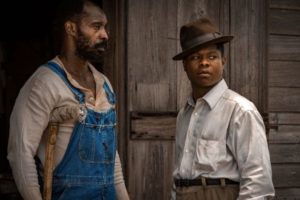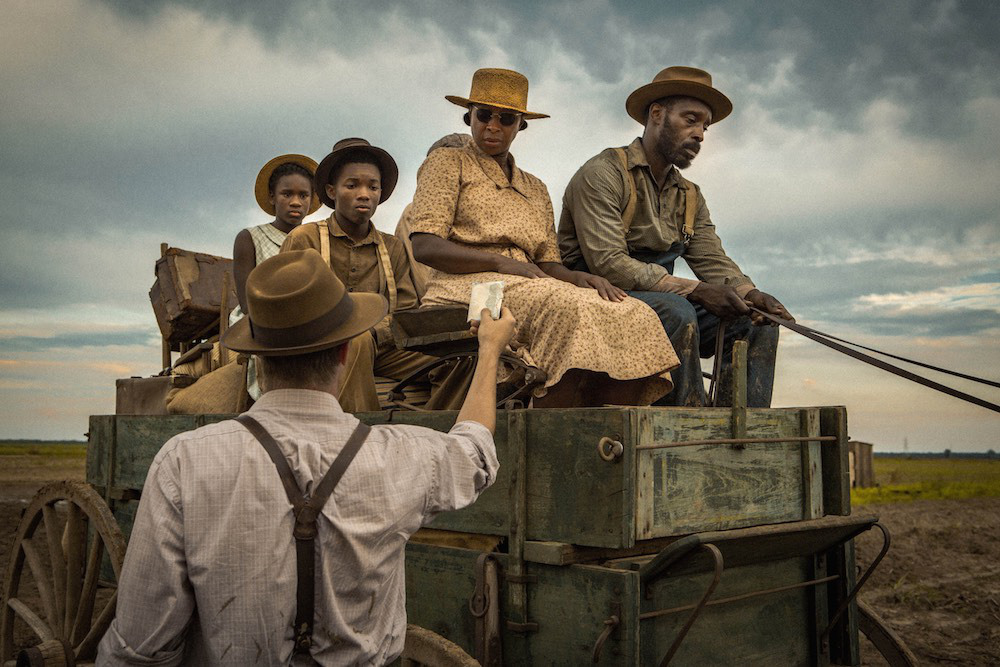What makes Netflix an entertainment industry juggernaut? Is it their extensive film and TV library, affordable monthly rates, or exclusive content like Stranger Things? Despite their pop culture dominance, there’s one area where the streaming giant isn’t leading the competition: Academy Awards recognition. Earlier this year, the company’s rival, Amazon, beat them to the Oscar podium. Amazon’s film Manchester by the Sea took home Oscar gold in two major categories that Netflix wasn’t even nominated for: Best Actor and Best Original Screenplay. Netflix’s latest movie Mudbound is the company’s unabashed reach for Oscar gold.
Back in January, Netflix acquired director Dee Rees’ film Mudbound, with the intention of giving it an extensive award season push. With its acclaimed director, exceptional ensemble cast, and thematic exploration of race in America, Mudbound has all the tools to keep up in the Academy Awards race. So, with the proper Oscar-bait pedigree and a giant push from Netflix, can Mudbound compete for the industry’s top honour?
Rees splits Mudbound’s narrative between two families living in rural Mississippi during the early 40’s. There’s the McAllans, a middle-class white family who packs up and moves out to the country so that their patriarch Henry (a rough around the edges Jason Clarke) may live out his dream of becoming a farmer. Henry’s cultured young wife Laura (Carey Mulligan) yearns for her city life routine. But Laura is also a traditional woman and she believes her place in life is to be a good wife who pleases her husband. They’re joined by Henry’s surly old father, Pappy (Jonathan Banks), a crotchety elder who makes Oscar the Grouch look like a bundle of joy. On the other end of the spectrum is Henry’s brother Jamie (Garrett Hedlund). He’s dashing, cultured, and looks great in a suit. And as soon as Jamie meets Laura you can feel their sexual tension.
The second narrative follows the Jacksons, a black family who rents the McAllan’s land. Hap (Rob Morgan), the husband and father, is a world-weary farmer with a strong desire to protect his family. Hap’s wife, Florence (Mary J. Blige) carries herself like an old soul who can barely contain her bleeding heart. Ronsel (an electric Jason Mitchell) is the eldest son. He’s kind towards his family and always wearing a warm smile. It’s 1941 and Ronsel and Jamie are called away to fight in WW II leaving both their families behind, struggling to farm their way out of poverty. The story gains traction when both men return home from the war and their different receptions dovetail into Mudbound’s deeper themes.
I understand why Mudbound may not resonate with mainstream audiences. The 134-minute feature plods along at the sluggish pace of a farm mule. The movie plays out like a series of glimpses into the day-to-day lives of the McAllans and the Jacksons, which is a blessing and a curse. Rees is effective at slowing the film down and making individual moments spring to life. At times the unforgiving Mississippi landscape is so vivid that you can almost feel the mud squishing beneath your feet and the sun beating down the back of your neck. Rees has a knack for recreating the subtle ebbs and flows of southern life, but these slow moments don’t always move the plot along with any degree of force.
Too much of the character’s plights are revealed through narration. Mudbound’s visuals do a wonderful job setting the tone and the talented cast often convey their feelings through what’s left unsaid. But far too often, narration cuts in to explain people’s thoughts and motivations and it cheapens the story’s impact. Instead of putting me inside the character’s heads the instances of narration took me out of the film. At its worst the narration felt as though someone was reading me a Wikipedia entry about the Jacksons and McAllans.
I enjoyed watching how Rees uses Mudbound to delineate between acts of racism and oppression. It’s a valuable lesson for audiences to learn as so many of today’s social conflicts arise from people who conflate the two. Racism is oppressive but oppressive people are not always racists. And while I appreciate the lengths Rees goes to provide both examples, many of her depictions of racism are cliché and uninspired. The racist characters feel one dimensional; they hate simply because people in that era were racists, which isn’t any kind of revelation.
The film could have done a better job expressing the root of people’s hatred. The McAllans are trapped on a rotten farm, watching their savings slip away, and unable to catch a break. Henry is a prime example of a man who becomes consumed with hatred and lashes out at the social class beneath him to make himself feel “big.” Today, Henry would be the ex-democrat coalminer who wants Trump to make America great again. Instead, we’re given the same token southern racism that we’ve seen in countless other films; backward mouth-breathing yokels spewing hate through their southern drawls. These racist caricatures still serve their purpose in the story. I found these men and their actions scary, disappointing, and even heartbreaking, but not at all insightful.
In addition to the overt racism making their lives hell, the Jacksons are also held down by a different type of oppression. When dealing with the Jacksons, the McAllans impose a passive aggressive willfulness. We watch each family endure hard times, but when the McAllans are down and out they rely on the Jacksons help to bail them out. And even when the Jacksons aren’t able to lend their support, they’re in no position to refuse the white family’s request, because the request is a subtle demand.
The scenario is similar to as if both families were sitting in separate rowboats, each one with a slow and steady leak. To avoid sinking, both families use buckets to scoop the water up and throw it overboard. But when the water gets too deep in the McAllan’s boat, they rely on the Jacksons to bring their bucket onboard and bail them out. It’s the type of “me before you” oppression that people don’t like to talk about although it’s a major aspect of America’s industrialization. An aspect that has affected generations of blacks, Chinese, Irish, Italians, and Mexicans. It’s this type of oppression that personifies the privilege of even a struggling white family like the McAllen’s: The McAllans are struggling because of poor decision making while the Jacksons struggle because they’re forced to sacrifice their time, their energy, and their health for the McAllans.
Visually, Mudbound lives up to its name. From the early onset, the movie thrusts viewers into a sea of beiges, browns, and other dull tones. Cinematographer Rachel Morrison (Dope, Black Panther) does a knockout job using color to make the audience feel the oppressive forces weighing down the characters. And while the film revels in its muted color scheme it also features its share of impeccable compositions and mesmerizing shots. When Mudbound does give us dashes of colour, like bright yellow flowers beneath an infinitely blue sky, it feels like stepping out of a smoke-filled room and taking a breath of fresh air. Whether characters are dancing in a lavish ballroom or trudging through thick black mud, Morrison’s fills every frame with visual splendour. Mudbound is a sight to behold.
Mudbound intrigued me, entertained me, but never moved me. As much as I appreciate the movie’s stunning cinematography, strong performances, and, epic scope, I never felt engrossed by the film. At times, my experience watching Mudbound felt almost clinical. The story felt too familiar and the character’s journeys too predictable for me to dial in emotionally. I expect that most viewers won’t be as nit-picky in regard to feeling the emotional toll of Mudbound’s highs and lows.
Mudbound is a harrowing look at the shackles that keep people from rising above their lot in life. These shackles take many forms: patriarchal dominance, social mores, and racial prejudices — even the cold hand of fate plays a role in tormenting the Jacksons and the McAllans. Rees recreates America’s toxic recent history to shed light on today’s cultural divides. Mudbound lacks the soul of past Best Picture nominees like Fences and Moonlight, but it’s still a powerful, well-crafted film, and a lock for this year’s award season conversations.
https://www.youtube.com/watch?v=xucHiOAa8Rs
- Release Date: 11/17/2017


